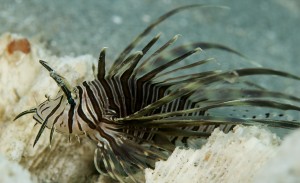 Ever heard of the lionfish? It’s actually quite a pretty fish with its pectoral fins, brownish stripes; however, it’s not so good for the Everglades. It’s considered an invasive species. Invasive species, non-native species to an area, happen to have the ability to live and thrive in habitats that are not their true home or region. Lionfish haven’t been a huge problem yet in the Everglades, but their numbers are increasing each year. In 2014, 13 lionfish were removed from Everglades National Park.
Ever heard of the lionfish? It’s actually quite a pretty fish with its pectoral fins, brownish stripes; however, it’s not so good for the Everglades. It’s considered an invasive species. Invasive species, non-native species to an area, happen to have the ability to live and thrive in habitats that are not their true home or region. Lionfish haven’t been a huge problem yet in the Everglades, but their numbers are increasing each year. In 2014, 13 lionfish were removed from Everglades National Park.
Although the numbers of lionfish aren’t large yet in the Park, there is a growing abundance of them in nearby waters. It is believed more and more will show up in the area. Currently, there is the “Everglades and Dry Tortugas Lionfish Management Plan” in review that will target specific areas within each park to help suppress lionfish from entering.
The lionfish is native to Indo-Pacific waters. It is a venomous, predatory fish that was introduce to the Atlantic waters around the 1980s. It is believed this fish made its way here either through aquarium trade or through ballast water on international boats. These lionfish can live in water anywhere from 1 to 1,000 feet in mangroves, seagrass, coral, hard bottom, and artificial reefs.
It is believed they could have a real big impact on the marine ecosystems here in south Florida. Their presence will decrease the number of native and commercial species. Although it doesn’t happen often, their stings are also known to be painful and can lead to serious injury.
Here are some ways lionfish are bad for the Everglades: they feed primarily on larvai and juvenile fish, they eat and consume a great variety of fishes and crustaceans, and they also eat herbivorous fish that graze on algae. With this behavior, the number of fish will dwindle, there will be less fish in the water and less fish for other predators to eat; also with more algae around, it can overgrow and keep coral and sponges from growing and thriving.
Right now, the lionfish is the only known invasive marine fish recognized at having invaded the entire Caribbean and coastal waters around southeastern United States. These fish are slow moving and easy to capture. Netting and spearing is usually used to capture them.
Take a Ride through the Everglades
If you’re in the Everglades and spot a lionfish, you should report the sighting to the National Park by calling 305-809-4738 or 305-562-0820. One way you might spot this invasive fish is on an airboat tour with Captain Mitch. Wouldn’t it be exciting to be the one to spot the creature who is harming the precious ecosystem you’re currently riding in? To book a tour, all Captain Mitch’s Airboat Tours at 239-695-3377 or click here.
 The Everglades is home to the Everglades Mink, hence the name! This small member of the weasel family is one of three types of minks found in Florida. The Everglades Mink happens to be the only one that lives in south Florida. They are semi-aquatic, carnivorous and also related to otters, ferrets, badgers, and martens.
The Everglades is home to the Everglades Mink, hence the name! This small member of the weasel family is one of three types of minks found in Florida. The Everglades Mink happens to be the only one that lives in south Florida. They are semi-aquatic, carnivorous and also related to otters, ferrets, badgers, and martens.





